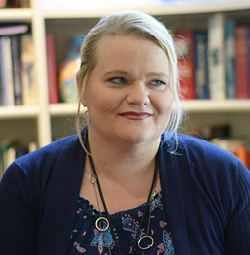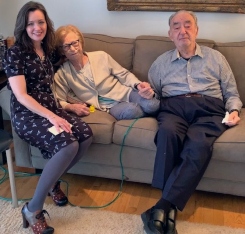VITAS Advantage: Case Study on 24/7/365 Care Support for Senior Living Communities
VITAS Case Study: Resident with Advanced Alzheimer’s Disease
KW* is an 88-year-old nursing home resident with advanced Alzheimer’s disease. She was recently discharged from the hospital for complications arising from aspiration pneumonia. Shortly thereafter, KW experiences dyspnea, agitation, and fever in the middle of the night.
Knowing that KW’s most recent hospitalization caused severe distress, her primary care physician and the facility’s director of nursing (DON) both suggest to her son, George, that his mother may be eligible for hospice services.
George agrees to a consultation, and the DON refers KW to VITAS. At 2:30 a.m., a VITAS admissions nurse arrives at the nursing home to meet with George.
Once George learns that VITAS’ care plan will focus on making his mother comfortable, and that her goals, wishes, and values are of utmost importance, he agrees to a hospice evaluation. After the VITAS nurse consults with her team physician, KW is certified as hospice-eligible, and she is transferred seamlessly to VITAS services while remaining in the facility.
For two days during KW’s first week of hospice enrollment, facility nurses coordinate with VITAS clinical staff for around-the-clock management of KW’s symptoms (e.g., delivery of O2 and initiation of medication to relieve shortness of breath and fever). VITAS continuous care (Intensive Comfort Care®, or ICC) provides temporary shifts of care of up to 24 hours when needed, per Medicare requirements.
Once KW’s symptoms stabilize, she continues to receive hospice services on the routine level of care, with frequent visits from the VITAS interdisciplinary team in partnership with the facility’s clinical staff. Twice during KW’s stay, staff members consult VITAS’ 24/7/365 Telecare line with questions about her care plan. She dies peacefully 28 days later with George at her side.
*These initials represent an anonymized resident and are used for the purposes of education only.
Families See Value in 24/7 Access to Hospice Teams
In a study of older patients with advanced dementia, researchers found that hospice care was associated with significant improvement in symptom management, caregiver burden, and satisfaction with care among participants’ families.
The study authors state that “all the families mentioned that the (hospice) program gave them a sense of being supported and that they would recommend it to others.” Many caregivers said they “felt more comfortable caring for their loved one, that suffering had been decreased, and that they learned more about the trajectory of dementia.”
Families cited around-the-clock access to the hospice multidisciplinary team and the team’s professionalism as the most valuable aspects of hospice care. Specifically, they appreciated staff members who were available by telephone 24/7 and who made additional visits as needed.
In the Israeli study, the hospice social worker who met with the family upon admission kept in close contact by phone and follow-up visits. Every patient was assessed for swallowing and potential aspiration difficulties, and a spiritual care provider visited as needed.
In summary, families reported that the hospice team helped improve the patient’s quality of life and reduce caregiver burden.
VITAS provides 24/7/365 clinical support to residents in senior living communities in important ways:
- The round-the-clock availability of VITAS hospice staff maintains your organization’s reimbursement/payment stream for non-hospice services and supports aging in place by bringing a range of hospice services—medical, emotional, and spiritual—directly to your resident. Avoiding relocation at the end of life is both emotionally and financially beneficial for the resident/family.
- When you refer to VITAS, you can trust its Telecare clinicians to answer any questions from your staff, your resident, their family or caregiver. When medically necessary, a VITAS clinician can respond at the bedside to address and stabilize a symptomatic resident, ensuring your staff always has back-up in case complex medical needs arise.
- Once a resident is receiving VITAS services, emergent conditions can often be handled without emergency measures. The priority at VITAS is providing high-quality care, supporting your staff, and keeping your residents out of the ED to help maintain your positive relationships with referring hospitals.
Source: Sternberg, S., Sabar, R., & Bentur, N. (2019). Home Hospice for Older People with Advanced Dementia: A Pilot Project. Israel Journal of Health Policy Research, 8(1), 42. DOI: 10.1186/s13584-019-0304-x
Is your patient ready for hospice?
Meet the VITAS Hospice Team

Physician
The physician closely monitors the progression of the patient’s illness, prescribes appropriate medications and coordinates care with other members of the team.
Hospice Nurse
The hospice nurse is skilled in assessing and managing pain and other symptoms. A nurse may also help with personal care.
Hospice Aide
Hospice aides provide personal care to the patient. They are also the “eyes and ears” for the rest of the hospice team.
Social Worker
The social worker acts as a friendly and skilled listener and provides emotional support.
Volunteer
The hospice volunteer can bring music or a Paw Pals animal companion, and spends quality time with the patient and family.
Chaplain
The chaplain ministers to the spiritual needs of patients and families of all faiths, and can work with their clergy.

